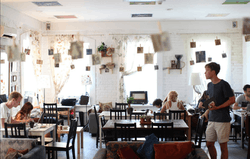Anti-café

Anti-café (also sometimes called a time club or a pay-per-minute café) is a type of a public business that became popular around 2011 in Russia and a couple of CIS countries. Anti-café is a place where people meet and spend time (either for leisure or work), similar to a café or a club, which is possible to ‘hire’ for a short time. Unlike a normal café, the primary purpose anti-café is intended to serve is communication rather consumption, but as in a regular café customers can order tea, coffee or other beverages. Typically, anti-cafés provide snacks and desserts, board games, coworking facilities, wireless Internet access, films and video game consoles (such as Xbox or PlayStation). Customers pay for time spent in the anti-café rather than for these additional facilities.
History
The anti-café concept was invented and first implemented by a Russian writer Ivan Mitin in December 2010 in Moscow.[1] Since then, anti-cafés have been spreading in Russia and neighbouring countries, with a first anti-café opened in Western Europe in 2012, in Paris. In 2013, the first UK branch of or Russian chain Ziferblat opened in London.[2] Another branch opened in 2015 in Manchester.[3]
See also
References
- ↑ Bert van Pool (24 October 2014). "A Trend in European Cities: The Anti-Cafe". The Huffington Post. Retrieved 12 November 2015.
- ↑ Vicky Baker (8 January 2014). "London's first pay-per-minute cafe: will the idea catch on?". The Guardian. Retrieved 12 November 2015.
- ↑ Lauren Davidson (10 February 2015). "Pay per minute, not per drink, at Manchester's new coffee shop". The Telegraph. Retrieved 12 November 2015.